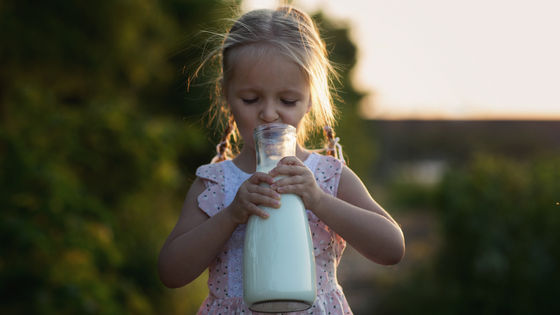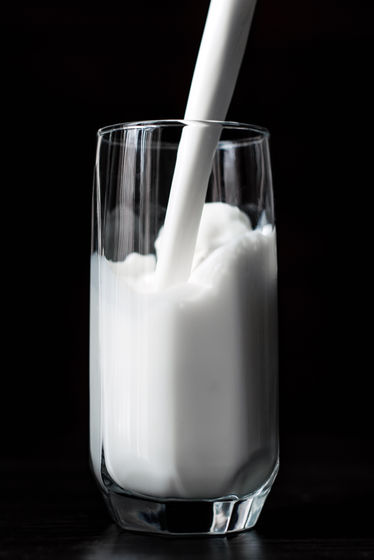It turns out that when people with lactose intolerance drink milk, their risk of type 2 diabetes decreases by 30%, and experts say that undigested lactose may be food for good bacteria.

A study focusing on the health and genetics of milk drinkers has found that drinking milk reduces the risk of type 2 diabetes in people with a genetic mutation that prevents the production of an enzyme that breaks down the lactose contained in milk. Ta. Experts believe that lactose remaining in the intestines without being broken down becomes a food source for intestinal bacteria, which changes the balance of intestinal bacteria, which may have a positive impact on the risk of lifestyle-related diseases. I'm wondering if there is.
Variant of the lactase LCT gene explains association between milk intake and incident type 2 diabetes | Nature Metabolism
Increased milk intake associated with a decreased risk of type 2 diabetes in adults who do not produce lactase
https://www.news-medical.net/news/20240122/Increased-milk-intake-associated-with-a-decreased-risk-of-type-2-diabetes-in-adults-who-do-not- produce-lactase.aspx
Lower type 2 diabetes risk seen in lactose intolerant milk drinkers
https://newatlas.com/health-wellbeing/lower-diabetes-risk-milk-drinkers/
For people with certain gene variants, drinking milk may reduce risk of type 2 diabetes
https://medicalxpress.com/news/2024-01-people-gene-variant-diabetes.html
expert reaction to study of lactose intolerance, milk intake and type 2 diabetes | Science Media Center
https://www.sciencemediacentre.org/expert-reaction-to-study-of-lactose-intolerance-milk-intake-and-type-2-diabetes/
The results of studies on milk and the risk of type 2 diabetes are mixed, with some papers saying it helps prevent lifestyle-related diseases, others saying it's unrelated, and some even finding it to be harmful. An example of a study showing that milk has a positive impact on preventing type 2 diabetes is a 2018 study that showed that consuming milk at breakfast reduces the subsequent rise in blood sugar levels and suppresses appetite. One example is research.
Research results show that drinking milk for breakfast lowers blood sugar levels not only after breakfast but also after lunch - GIGAZINE

Thinking that the variation in research results may be due to differences in individual DNA, a research team from the United States and China first investigated the daily milk intake of 12,653 Hispanics and Latinos. We conducted genome-wide association analysis (GWAS) to analyze the relationship between and genes.
Most people are able to make the enzyme lactase, which breaks down lactose, as children, but some people with mutations in the lactase gene (LTC) are unable to make lactase as adults. lactose intolerance (LNP). In particular, it is said that 50% to 80% of Hispanics, 60% to 80% of blacks, and 95% to 100% of Asians, including Japanese, are LNP (PDF file) .
Genetic analysis revealed that people with LNP who regularly consumed milk had a 30% lower risk of type 2 diabetes. On the other hand, it was also found that regular intake of milk did not change the risk of type 2 diabetes in people without the genetic mutation.

Next, when the research team analyzed UK Biobank data for 160,000 people living in the UK, similar results were obtained, supporting the results of the first analysis.
Further analysis also revealed that increased milk intake was associated with changes in the intestinal flora, specifically an increase in Bifidobacterium and a decrease in Prevotella bacteria.
According to Lonneke Janssen Duijghuijsen of Wageningen University in the Netherlands, who was not directly involved in this research, LNP does not necessarily mean that it is impossible to consume lactose. Although there are individual differences in tolerance to lactose, previous research has shown that ``even people with LNP have little to no worry about suffering from lactose intolerance symptoms if they consume 12 g of lactose per day.'' 12g of lactose is equivalent to one large glass of milk.

Duijghuijsen said, 'People with LNP cannot digest the lactose in milk because the small intestine does not produce the lactase enzyme. As a result, the undigested lactose in the small intestine becomes an energy source for intestinal bacteria.' I talked to him. This process was also clarified in another study published by Duijghuijsen et al.'s research team in December 2023.
However, the results of this study do not prove a causal relationship such as ``Drinking milk improves the balance of intestinal bacteria and prevents type 2 diabetes.''
As such, Duijghuijsen said, 'Our study aims to investigate the potential effects of milk intake by specific groups of people on the gut microbiota and its metabolites and its potential relationship with specific health outcomes.' 'It does not provide clear dietary recommendations,' he said, noting that more research is needed to clarify the benefits of milk on lifestyle-related diseases.
Related Posts:







